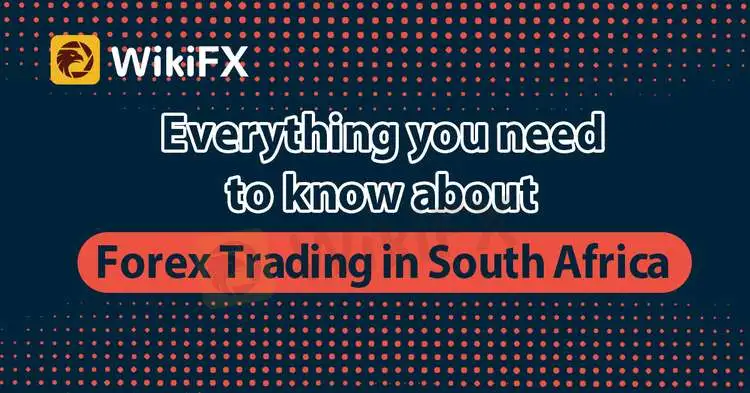Everything you need to know about Forex Trading in South Africa
Abstract:The foreign currency market is the world's largest financial market, with daily trading volume exceeding 85 trillion ZAR.South Africa's daily forex trading volume is projected to be approximately 271 million ZAR, and the South African rand is among the top 20 most traded currencies, with an annual trading volume over 1 trillion ZAR.

The foreign currency market is the world's largest financial market, with a daily trading volume exceeding 85 trillion ZAR. South Africa's daily forex trading volume is projected to be approximately 271 million ZAR, and the South African rand is among the top 20 most traded currencies, with an annual trading volume of over 1 trillion ZAR.
Forex trading has expanded dramatically in South Africa over the last years as it has been generally acknowledged as a pastime, side-hustle, and even a professional vocation for many. Forex trading, like many other trades, comes with a risk warning since it is a leveraged financial instrument, and many retail traders can lose a large amount of money.
REGULATION OF FOREX
Before dealing with forex brokers, South African traders must confirm that the forex market is regulated. Market regulators such as the Financial Sector Conduct Authority (FSCA) in South Africa, the Financial Conduct Authority (FCA) in the United Kingdom, and others require license and authorization.
The Financial Services Commission of South Africa (FSCA) is a respected and trustworthy authority that monitors all Financial Service Providers and offers South Africans the help and protection they require.
Many unregulated forex brokers offer South African investors trading accounts and favorable trading conditions, but they cannot verify that client funds are secure or that South African traders are safe when trading foreign currency and other financial products.
When trading forex, South African traders must ensure that the broker is licensed and authorized, since authorities examine the trading activities of FSCA-registered brokers to see if they can meet their financial commitments and offer a fair and safe trading environment.
FOREX FEES AND COSTS
Because the forex market is the most liquid in the world, South African forex brokers may offer cheaper transaction fees. However, not all brokers are created equal, and forex traders should do a thorough broker comparison to select the forex broker that best suits their trading needs.
Spreads, commissions, overnight costs, conversion fees, margin requirements, leverage, and a variety of additional expenses must all be considered by forex traders to ensure that they are in line with their specific trading strategy.
Traders must also consider non-trading fees such as inactivity, withdrawal and deposit fees, and any other expenses they may incur. Traders must assess how much forex trading will cost them and how much free cash they can devote based on their own financial circumstances.

Disclaimer:
The views in this article only represent the author's personal views, and do not constitute investment advice on this platform. This platform does not guarantee the accuracy, completeness and timeliness of the information in the article, and will not be liable for any loss caused by the use of or reliance on the information in the article.
Related broker
Read more

Cyprus Regulator on a License Suspension Marathon
Recently, the Cyprus Securities and Exchange Commission (CySEC) issued statements regarding the suspension and revocation of licenses for three investment firms in accordance with The Investment Services and Activities and Regulated Markets Law.

MetroTrade Now NFA Member & CFTC Introducing Broker
MetroTrade LLC's recent registration with the CFTC as an introducing broker and its NFA membership signify a significant development, as the company prepares for a summer launch to offer traders access to the CME Group's U.S. futures exchanges.

FXM Scam: Trader Lured into Investment Scheme & Left Unable to Withdraw Funds
Amidst a distressing account involving Nguyen Truong and the FXM brokerage platform, his inability to withdraw $12,400 underscores the risks of online trading. Truong's encounter serves as a cautionary tale, emphasizing the need for diligence in broker selection.

DESPITE A SHARP FALL IN FX, FOOD COSTS CONTINUE TO RISE.
The present increase in the cost of food and agricultural commodities is a frequent grievance in Nigeria. Prices have stayed high despite the fall in forex, despite the fact that many traders have attributed the high costs to the rise in the dollar.
WikiFX Broker
Latest News
CySEC withdraws license of Forex broker AAA Trade
Finalto Elevates OTC Trading With FSCA-Approved Liquidity
Ringgit Weakens Amidst Battling Global Economic Turmoil
WikiFX Broker Assessment Series | Oroku Edge: Is It Trustworthy?
DESPITE A SHARP FALL IN FX, FOOD COSTS CONTINUE TO RISE.
Complaint against Capitalix
Hong Kong Authorizes Spot Bitcoin & Ether ETFs
Webull Canada Unveils Desktop Trading Platform
Alert: Beware Unlicensed Trading Broker ProMarkets
MetroTrade Now NFA Member & CFTC Introducing Broker
Currency Calculator


